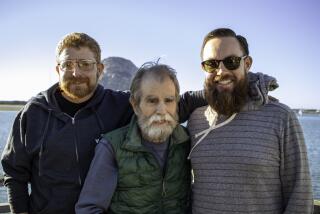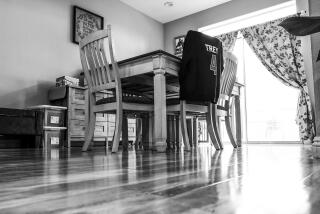Slaying of Honors Student Detailed : Courts: Youth convicted in the killing testifies that Stuart A. Tay begged for help. Defendant masterminded the attack, witness says.
- Share via
SANTA ANA — Before he was slain on New Year’s Eve, 1992, honors student Stuart A. Tay begged for help and cried “What did I ever do to you?” as two teen-agers beat him with baseball bats and a sledgehammer.
Those details came Thursday from an 18-year-old Fullerton youth who recounted the final, brutal night of Tay’s life as prosecutors opened their case against Robert Chan, the first of four teen-agers facing trial for the killing.
As the trial got under way Thursday morning, Chan’s mother apparently fainted. Suh Chan was helped from the courtroom by her husband, Tony, and treated by paramedics.
Calmly, almost clinically, the prosecution’s star witness described how Chan, 19, orchestrated the assault, joined the beating, then poured rubbing alcohol down Tay’s throat before sealing the boy’s mouth and nose with duct tape.
“He told me he had a grave ready for Stuart Tay,” Charles Bae Choe testified before an Orange County Superior Court jury. Choe said he helped Chan and the others wrap Tay in a sheet before burying him in a Buena Park back yard.
Chan’s trial stands out because the victim and the accused were seemingly model youths who came from well-off, loving families. Chan was a candidate for valedictorian at his high school; Tay, 17, had the grades to become a physician, like his father.
But defense and prosecuting attorneys told jurors the evidence will reveal darker sides to the youths, who apparently were engaged in a high-stakes game of one-upmanship that involved “power trips” and bragging about gang involvement, counterfeiting, and buying and selling weapons--criminal activities that may not actually have taken place.
Prosecutors say the murder was a senseless one, committed because the perpetrators believed the victim intended to inform on them about a robbery they had planned together.
Choe has pleaded guilty to first-degree murder and was sentenced to the California Youth Authority rather than state prison. He is helping prosecutors in their attempt to convict his former friend.
Three others charged in the case--Abraham Acosta, 17, of Buena Park and Mun Bong Kang and Kirn Young Kim, both 18 and of Fullerton--face trials after Chan’s case concludes.
Choe insisted Thursday that Chan was the ringleader. He said that Chan arranged for the digging of the grave in Acosta’s Buena Park back yard and lured Tay to the family’s garage under the guise of meeting to sell him a handgun.
Choe said it was Chan who concocted a scheme to make Tay look like the victim of a carjacking by dropping his sports car off in Compton--with the keys still in the ignition. Choe said he stood by as the attack unfolded but said he did not join his friends.
When Chan gave a prearranged nod, Acosta landed the first blow of the bat on Tay’s head and was joined by Chan, Choe said.
“(Tay) was crying, he was asking for help,” Choe told the jury.
When one of the bats broke, Chan continued with a sledgehammer, Choe said. He said that after a beating that lasted about 20 minutes, Tay was still breathing, so Chan poured rubbing alcohol down his throat and taped his mouth and nose. Pathologists say Tay ultimately choked to death on his own vomit.
In his opening statement Thursday, defense attorney Marshall M. Schulman portrayed his client as suffering from paranoid schizophrenia. Chan was convinced that his own life was being threatened by Tay, who on occasion said he was a Secret Service Agent or a member of the CIA, Schulman said.
In his fragile mental state, Chan, then 18, had come to believe Tay was a powerful gang member who had countless followers at his command, Schulman told jurors.
Chan, who is expected to testify, faces life in prison without parole if he is convicted.
Schulman sought to dispute the prosecution’s attempt to portray his client as the mastermind, telling jurors that Acosta had bragged about killing two people using bats, rubbing alcohol and tape--the same methods used to kill Tay. Prosecutors, however, said there was no evidence that such killings had occurred.
More to Read
Sign up for Essential California
The most important California stories and recommendations in your inbox every morning.
You may occasionally receive promotional content from the Los Angeles Times.














